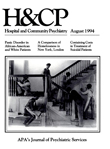Collaboration Between Social Work and Psychiatry in Aftercare in the Early 1900s
Abstract
The nature of the effort required of a holistic practice with severely and chronically mentally ill persons, integrating, on a practical level, a complex field of information and influences, can already be seen in the earliest social work aftercare practice. This practice and the ideas that shaped it occurred decades before deinstitutionalization and case management became policy passwords, and policies and programs are still evolving to adequately recognize and appropriately channel the effort and resources required.
In looking back at the early professional collaboration between socialwork and psychiatry, we confront the vision that infused it. We recognize the need for continued shared struggle to conceive and to implement an integrated and collaborative vision of treatment, care, and rehabilitation for persons with serious mental illness: a vision that fundamentally recognizes the moral necessity for treatment that is caring, the therapeutic potential of care that is proper, and the value of comprehensive rehabilitation that is medical, psychological, and social.
Access content
To read the fulltext, please use one of the options below to sign in or purchase access.- Personal login
- Institutional Login
- Sign in via OpenAthens
- Register for access
-
Please login/register if you wish to pair your device and check access availability.
Not a subscriber?
PsychiatryOnline subscription options offer access to the DSM-5 library, books, journals, CME, and patient resources. This all-in-one virtual library provides psychiatrists and mental health professionals with key resources for diagnosis, treatment, research, and professional development.
Need more help? PsychiatryOnline Customer Service may be reached by emailing [email protected] or by calling 800-368-5777 (in the U.S.) or 703-907-7322 (outside the U.S.).



